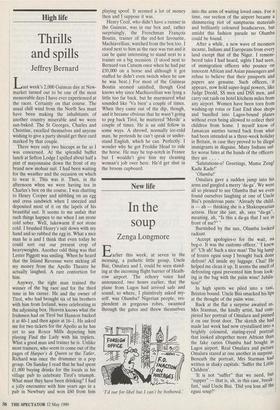New life
In the soup
Zenga Longmore
Earlier this week, at seven in the morning, a pathetic little group, Uncle Bisi, Omalara and I, could be seen stand- ing at the incoming flight barrier of Heath- row airport. The echoey voice had announced, two hours earlier, that the plane from Lagos had arrived safe and sound, so where, I plaintively asked my- self, was Olumba? Nigerian people, res- plendent in gorgeous robes, swanned through the gates and threw themselves 'I'd sue for libel but I can't be bothered.' into the arms of waiting loved ones. For a time, our section of the airport became a shimmering riot of sumptuous materials and brilliantly coloured headscarves, but amidst this fashion parade no Olumba could be found.
After a while, a new wave of incomers incame, Indians and Europeans from every land except that of the Niger. I remem- bered tales I had heard, sights I had seen, of immigration officers who pounce on innocent African and Asian passengers and refuse to believe that their passports and papers are genuine. Such officers, it appears, now hold super-legal powers, like Judge Dredd, SS men and DSS men, and carry out raids on hotel kitchens miles from any airport. Women have been torn from washing-up rotas or East End shoe shops and bundled into Lagos-bound planes without even being allowed to collect their children from home. I myself know of Jamaican aunties turned back from what had been intended as a three-week holiday in Britain, in case they proved to be illegal immigrants in disguise. Many Indians suf- fer worse fates at the hands of the officers: they are . . . . `Salutations-o! Greetings, Mama Zeng! Kadu' Kade!'
`Olumba!'
Omalara gave a sudden jump into his arms and gurgled a merry `da-ga'. We were all so pleased to see Olumba that we even found ourselves laughing at one of Uncle Bisi's ponderous puns: 'Already the child, is — ah — thinking she is a Shakespearian actress. Hear she just, ah, says "da-ga", meaning, ah, "Is this a da-ga that I see in front of me?" ' Burnished by the sun, Olumba looked radiant.
`Accept apologies-o for the wait, na beg-o. It was the customs officer.' I knew it!' Uh uh! Such a nice man! The big lump of frozen egusi soup I brought back done defrost! All inside my luggage. Chai! He helped me clean it up. It seems the smell of defrosting egusi prevented him from look- ing in the bag with the palm wine! Jubila- tion!'
In high spirits we piled into a taxi, Brixton bound. Uncle Bisi smacked his lips at the thought of the palm wine. Back at the flat a surprise awaited us.
Mrs Starman, the kindly artist, had com- pleted her portrait of Omalara and pinned it on our front door. The sketch she had made last week had now crystallised into a brightly coloured, staring-eyed portrait that looked altogether more African than the fake curios Olumba had bought in Lagos airport. Real Omalara and picture Omalara stared at one another in surprise. Beneath the portrait, Mrs Starman had written in shaky capitals: 'Suffer the Little Children'.
`It is not "suffer" that we need, but "supper" — that is, ah, in this case, break- fast,' said Uncle Bisi. 'Did you lose all the egusi soup?'




























































 Previous page
Previous page